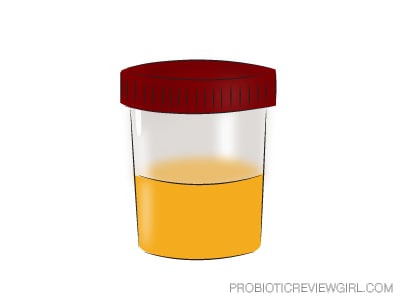Do Probiotics Make You Pee More?
If you have felt an increase in your urination after taking probiotics you are not alone. Hundreds of people look up variations of the question suggesting that probiotics do increase the frequency of urination.
In this blog post, I am going to delve into the studies on urinary health and probiotic bacteria to figure out if there is any sort of connection.
Spoiler alert, there is a serious lack of clinical research in the matter.
What a Gastroenterologist Thinks

I asked Dr. Mesilhy a gastroenterologist on our medical team for her thoughts and she told me that:
"Up till now, no studies mentioned that frequent urination or change in urine color as a side effect for probiotic use.
The benefits of probiotics extend to the urinary system health, studies shown a potentiality for improvement of the recurrent urinary tract infections and prevention from urinary cancer.
However, further studies are needed to demonstrate the specific mechanism."
Urination 101

Orange Urine Sample In Container
Before I start explaining whether probiotics can make you pee more often I think it would first be helpful to explain a little bit on how urination actually works.
Urination is a natural and necessary bodily function that helps to remove waste products and excess fluids from the body. The process of urination is controlled by the urinary system, which includes the kidneys, ureters, bladder, and urethra.
The kidneys are responsible for filtering the blood and removing waste products and excess fluids, which are then transported to the bladder through two tubes called the ureters.
The bladder is a muscular sac that can expand and contract to hold and release urine. When the bladder is full, it sends signals to the brain to trigger the urge to urinate.
During urination, the muscles in the bladder contract, which pushes the urine through the urethra and out of the body. In men, the urethra runs through the penis, while in women, it is shorter and opens just above the vaginal opening.
Factors such as fluid intake, diet, medication, and medical conditions can all affect the frequency and volume of urination. It is essential to maintain a healthy urinary system to prevent problems such as urinary tract infections, kidney stones, and incontinence.
Can Probiotics Make You Pee More?
Whilst there is some research that show taking probiotics can make you poop more often than you usually do and even in some cases change your stool color, size or shape.
It's not clear if probiotics can make cause frequent urination.
There isn't a single clinical study out there so far in 2023 that has mentioned the efficacy of probiotics in increasing or altering urination.
1MD nutrition claimed that probiotics could in fact cause more frequent urination through their Detoxifying properties, but they didn't cite a study to back up this claim. So, I am not sure why they even wrote that.
I tried searching places like Reddit and Quora for user reports of having the urge to pee more often after taking a probiotic supplement but could not find any.
I have been taking probiotics on and off for many years now and have never noticed more frequent urination and neither has my partner. I have however noticed positive changes in my urinary tract health.
Can Probiotics Change Your Urine Color?
Just like for increased urination, there are not studies for urine color and probiotic bacteria. But, I did however find this interesting Reddit thread from 2022 in the vitamins sub-reddit.
The Redditor claimed that after taking probiotics and a B-Complex vitamin they noticed their urine turning a greenish color which worried them.
Other quick thinking Redditors chimed in to say that this was probably down to the Riboflavinuria and not the probiotics.
This does raise an interesting point in that if you feel you started peeing more often after probiotics you should also think about any other supplements you are ingesting.
Different Types Of Increased Urination
- 1An increase in frequency of urination which from personal experience feels like having to urinate more often than usual, even when the amount of urine you pass each time is normal or low.
- 2You have a sudden urge to urinate, even if you just went to the bathroom and is known as urinary urgency.
- 3Peeing a large amount of urine than usual is called polyuria. This one may be difficult to notice unless you are conscious of how much you usually pee.
How Probiotics May Affect Bladder Health
Studies like this one have shown that certain strains of probiotics, particularly those from the lactobacillus family, can help to prevent and assist with UTIs by suppressing pro-inflammatory cytokines like TNF-α and IL-6.
This is because lactobacillus strains produce lactic acid, which can help to create an acidic environment in the urinary tract that is hostile to pathogenic bacteria.
Overall, probiotics have the potential to be a safe and effective alternative or complementary treatment option for UTIs and other bladder-related issues.
However, it is important to note that more research is needed to fully understand the potential benefits of probiotics for bladder health, and to determine the best strains and dosages to use for specific conditions.
It is also worth noting that not all probiotics are created equal, and different strains may have varying effects on bladder health. It is important to choose a high-quality probiotic supplement that contains specific strains shown to be effective in promoting bladder health.
Closing Thoughts
In conclusion, while there is no evidence to suggest that probiotics can cause frequent peeing, they may have a positive effect on your urinary tract health.
Probiotics, particularly those from the lactobacillus family, have been shown to assist with UTIs, and may be a safe and effective alternative or complementary treatment option.
However, more research is needed to fully understand the potential benefits of probiotics for bladder health. Make sure to first talk with a doctor before starting any probiotics. I am not a Doctor.
If you have noticed any changes in your peeing habits please share your experience below in the comment section. It is possible that certain probiotic strains can cause more frequent urination but have not been studied yet.

Alicia Harper is a NASM-CNC Certified nutritionist and the editor of ProbioticReviewGirl.
After suffering from recurrent gut issues she spent years researching Probiotics and the microbiome.
She has tested 29+ different Probiotics and is a probiotics expert. As a probiotic fanatic, she has valuable knowledge to share with the world.
 Medically reviewed by:
Medically reviewed by: